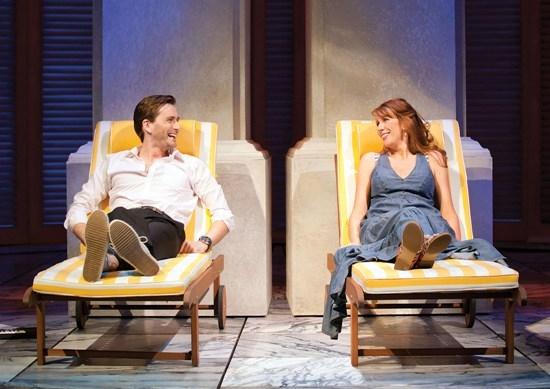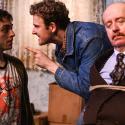If a great whorl of bubblegum were plonked on Trafalgar Square's fourth plinth all summer long, would there be any point in complaining about it? How do you criticise the uncriticisable? A new Much Ado About Nothing at Wyndham's is Shakespeare-by-television: failsafe. As theartsdesk has recently pointed out, there is the "other production" at the Globe, which celeb chatter over and vast publicity for this brassy West End one have conspired to relegate to a sideshow somewhere obscure south of the Thames. Chances are, the latter's more like a Much Ado people will want to see and be moved by than Charing Cross Road's monster sell-out would ever try to be. TV, anyone?
If you've neither watched Doctor Who in the last decade nor enjoyed The Catherine Tate Show in the same period, what you'll see at Wyndham's is a predictably loud, shake-'em-on-down version of Shakespeare's most barbed mature comedy (written, probably, in 1598, preceding by a year or two Twelfth Night and As You Like It), with some good ideas and wretched vulgarities, and you might think: hm, good Benedick, cute, whippet-thin and who exactly is he? And how did that curvaceous redhead get the part of Beatrice?
 Reservations here don't matter. I have it on good authority that David Tennant (pictured) and Catherine Tate have each invested, financially, in the production, the return on which must convince them they've got the play right, though director Josie Rourke must take credit for a slick, attractive staging on this most cramped of prosceniums. Revolve; pillars; fake marble flooring; shuttered windows at the back. Its tidy economy of scale is one of its principal virtues.
Reservations here don't matter. I have it on good authority that David Tennant (pictured) and Catherine Tate have each invested, financially, in the production, the return on which must convince them they've got the play right, though director Josie Rourke must take credit for a slick, attractive staging on this most cramped of prosceniums. Revolve; pillars; fake marble flooring; shuttered windows at the back. Its tidy economy of scale is one of its principal virtues.
It's set in Spain, on the Costa del Sol - maybe Gibraltar - where the men, when not in starched white naval livery, schmooze around in beach shorts and the women seem dressed for a perpetual disco. We're in the 1980s. The dancing's awful and, in the first half, a wantonly superficial sense of style removes the languor and sultriness from this Much Ado, which, in the text, takes place in Messina, Sicily; though it tries, this does little to enhance the play's witty, contemporary appeal (something Bill Alexander so famously found in 1986 by overlaying an RSC The Merry Wives of Windsor with the 1950s).
If we ignore the stars for a moment, the acting across the board is fine. Adam James's Don Pedro, the good brother who woos his host Leonato's daughter Hero on his friend Claudio's behalf, is light and winning. Elliot Levey's bad brother, the malcontent Don John, who spoils the fun by helping trick Claudio into believing Hero is unfaithful just before they get married, is excellent as a sharp-voiced spiv. Sarah MacRae does well with charm and poise in the minimally speaking role of Hero, while special commendation must go to Tom Bateman, fresh from LAMDA (and looking uncannily like a younger Roger Federer), as Claudio: his diction is superb, his charisma easy, and he is properly on song - fiery but controlled - in the important scene when he falsely denounces Hero at the altar.
No stranger to Shakespeare, then, David Tennant as Benedick fills the part and stage with a rare, seasoned confidence and is never less than watchable. He turns, Cupid-like, almost every line of his soliloquies into a "paper bullet" (Benedick's phrase) to melt the audience - could he ever fail to? - and Rourke has come up with some spectacularly inventive business with white paint in Act II, scene 3 when the reluctant lover overhears reports of Beatrice's "love" for him. Tennant is a naturally funny actor, nicely complemented in the comic subplot by John Ramm's over-the-top, gun-toting soldier-idiot Dogberry. Rourke has pitched the sometimes tedious nightwatch scenes very well.
But she can't do much about Catherine Tate as Beatrice. I'm a fan of her TV show, though I know she divides opinion - but it was Tate I was most looking forward to. Beatrice should, or can, be skittish, flirtatious and unpredictable. Tate is matter-of-fact, hard-nosed and static. She has one basic gesture, and that's finger-pointing. Her accent slews all over the place, from courtly posh to estuary - familiar, of course, from her screen comedy - and throughout it's as if she's just one step or chortle or guffaw away from the parody and mockery, the self-mockery, that make her TV characters so compelling. Here, she just doesn't trust the part, or get its sexiness, or truly play, as she should, with the admirably playful Tennant, though to do her justice, ironically she grows into it when she has to become serious over Benedick "killing" Claudio.
Tate isn't helped by one of the worst ideas of the evening when, in her overhearing scene (Hero and Ursula chat about Benedick's eye for her), she flies up and down on a pulley, and flails mid-air, a house painter on the other end. This unfunny pantomime device should be scrapped immediately. Other straying from the text - Barachio visibly screwing his girlfriend and calling her "Hero" for Claudio's benefit, Claudio drinking himself into a ghost-seeing stupor on the night before he has to marry Hero's "replacement" - can be forgiven. Rourke knows what her West End audience needs to be helped with. It's just not always a lovely sight.















Add comment